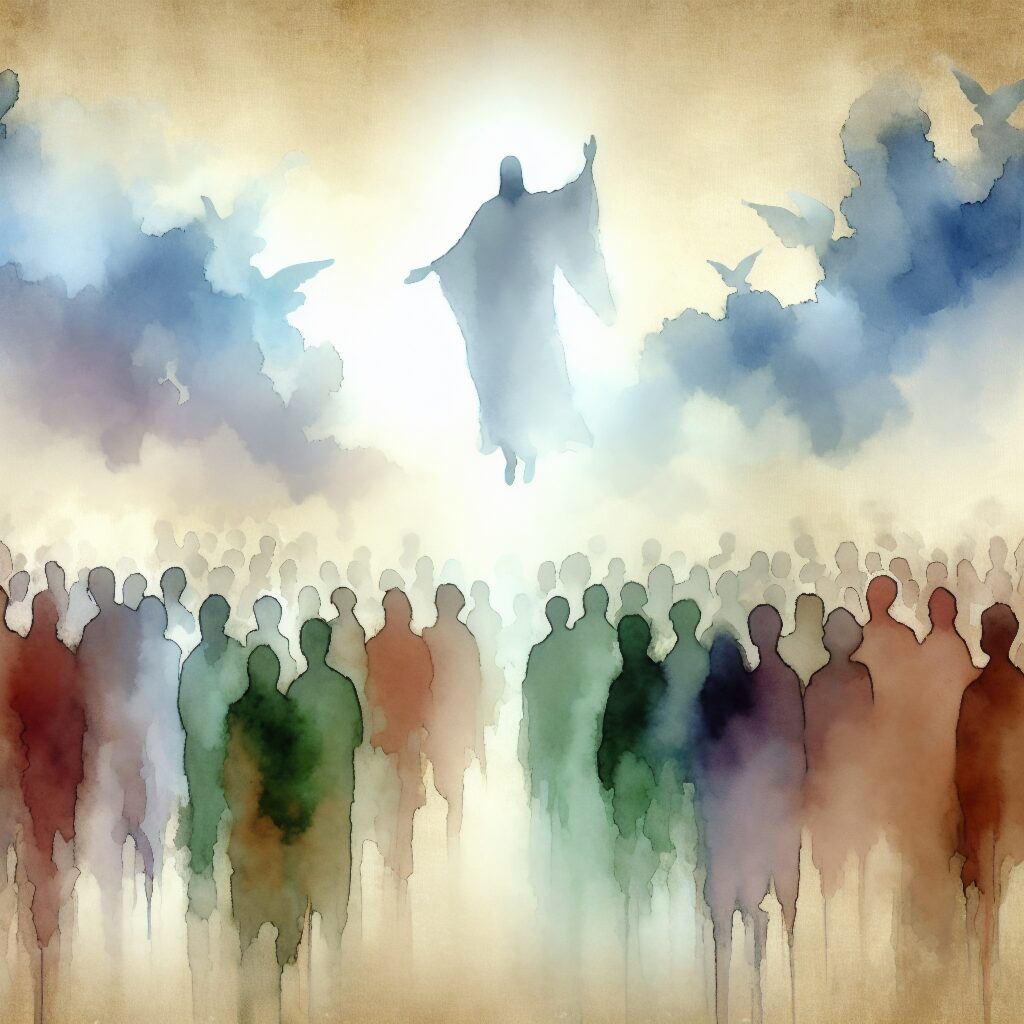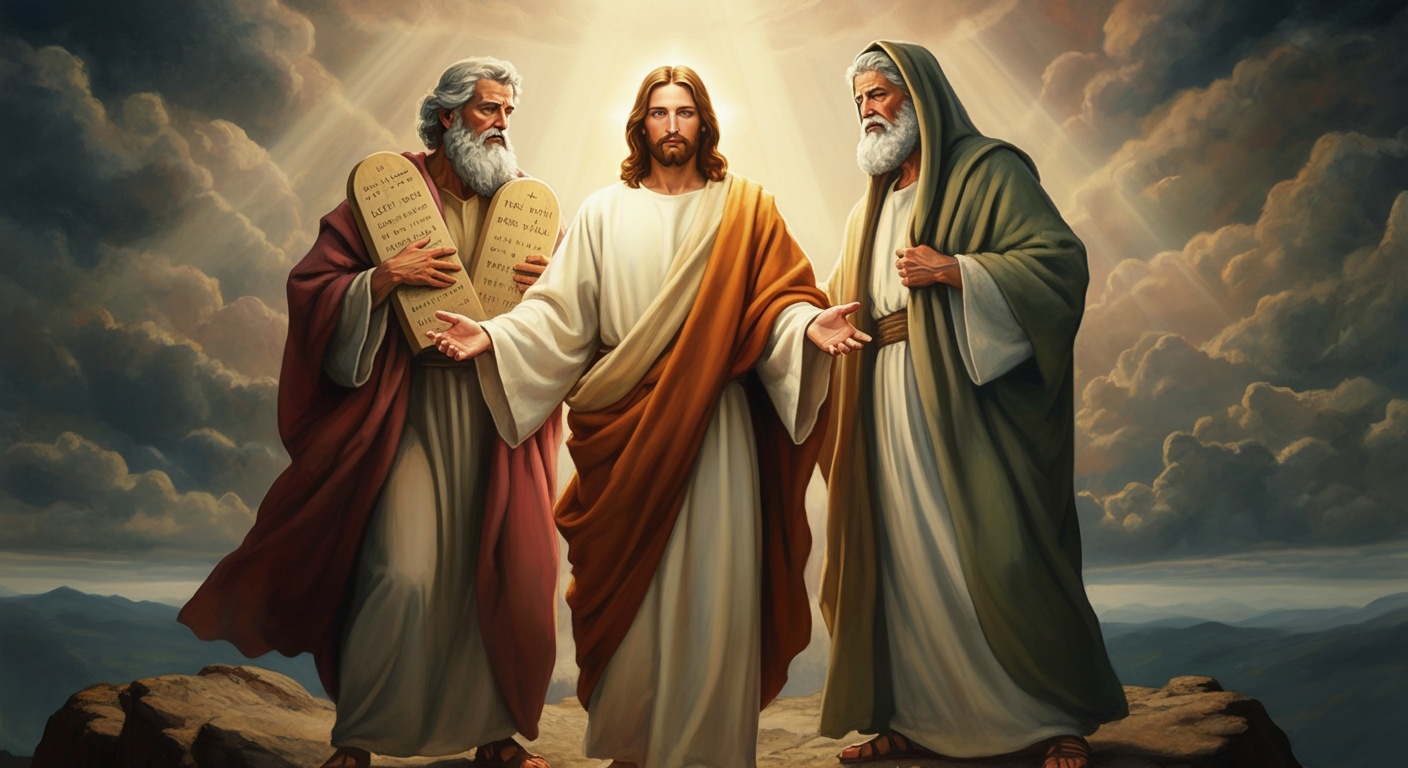Judaism is radically liberal in its view of how any person may approach God. It does not claim to be the one and only true path to righteousness. It is the path for the Jewish race and for those who opt to become proselytes. But it acknowledges that there are paths other than Judaism.

Amongst the hundreds of characters in the Hebrew Bible, God calls only two people righteous and upright. They’re Noah[1]Genesis 7:1 and Job[2]Job 1:8. Neither was a Jew. Neither was under the law.
It goes further. It acknowledges the divine ordinances of other faith traditions. It honours the priesthood of Melchizedek, the king-priest of Salem,(Genesis 14:18)) and the priesthood of Jethro, Moses’ father in-law[3]Exodus 18:12. Neither of them was a Jew. Neither was under the law.
None of the other Abrahamic faiths could countenance the proposition that one might please God by any means other than that which was revealed to their prophets and apostles. Even within faiths, folks were often at each other’s throats about whose specific revelation was authentic.[4]Galatians 1:8-9
Judaism was hewn out of God’s covenant with one man and was expressed in a series of laws to his children. If you weren’t a descendant of Jacob nor of the mixed multitude that joined the Exodus out of Egypt, you had no part in the Sinaitic covenant and its laws.
So why is the covenant faith so large of heart?
The late Rabbi Emeritus Jonathan Sacks wrote that it was a theological equivalent of an allegory to teach that we’re all made in the image and likeness of the one God, although we differed in physiology and complexion. I think there are other approaches to exploring the character of the covenant faith.
Judaism was hewn out of God’s covenant with one man, Israel, and was expressed in a series of laws to his children. As the Deuteronomist writes:
“Moses commanded us a law, even the inheritance of the congregation of Jacob.”[5]Deuteronomy 33:4
God didn’t make that covenant with all nations nor crafted its laws for all people. If you weren’t a descendant of Jacob nor of the mixed multitude that joined the Exodus out of Egypt, you had no part in that covenant and its laws.
As it is not a universal covenant, God is careful to not tether the eternal fate of humanity to the requirements of the laws of Moses. They are simply the guardrails of his covenant with one family and a mixed bag of co-travellers. At best, Moses hopes the covenant will serve as a model for other nations, but not the faith of everyone.
If God would reveal Himself to the entire human race, He’d have to do so by a different and new, all-encompassing revelation, a New Testament. It is not a supersessionist covenant. It does not make any other covenant old. It’s new in the sense that nothing like it existed prior.
This proposition collides with received wisdom and ‘revelation’. Didn’t Jeremiah prophecy that God would tear up the old covenant and make a new one? Indeed he did. But context matters. God couldn’t possibly tear up a covenant he didn’t make with me or any other African, Asian or anyone else who wasn’t a Jew nor descendants of the mixed multitude that left Egypt in the Exodus. There wouldn’t be much sense in doing that as there existed no covenant to shred. That’s why Jeremiah addressed his prophecy to the ‘houses of Israel and Judah’;
“Behold, the days come, saith the LORD, that I will make a new covenant with the house of Israel, and with the house of Judah…”( Jeremiah 31:31))
But didn’t the epistle to the Hebrews reveal that the New Testament enacted by Christ Jesus fulfilled the prophecy of Jeremiah?[6]Hebrews 8:10-13
If God would reveal Himself to the entire human race, He’d have to do so by a different and new, all-encompassing revelation, a New Testament. It is not a supersessionist covenant. It does not make any other covenant old. It’s new in the sense that nothing like it existed prior.
That is the elephant in the room!
To start with, the epistle to the Hebrews was addressed to messianic Jews, not the Gentile church. The Messianic Jew was born into the Sinaitic covenant and then called into a new one in Christ Jesus. Although theologically adroit, the writer of the book of Hebrews, as with other writers of the New Testament books, was limited by his fixation on exploring the place of Jesus in the story and destiny of Jews and in Israel as a theocratic experiment.
This fixation finds expression in several books of the New Testament. On the road to Emmaus, Cleopas tells Jesus, not discerning His person, that Jesus would have fulfilled Israel’s messianic hopes, a liberation from many of the socio-economic and colonialist, oppressive forces that were the bane of Jewish life. In Cleopas’ words:
“But we trusted that it had been he which should have redeemed Israel…”[7]Luke 24:21
Perhaps the most iconoclastic of this fixation is in epistle to the Galatians. Written to shoot down Jews who insisted that Gentiles needed to adhere to the Mosaic laws in order to be saved, St Paul wrote:
“Christ hath redeemed us from the curse of the law, being made a curse for us: for it is written, Cursed is every one that hangeth on a tree.”[8]Galatians 3:13
This statement is routinely cited by the Church as Jesus’ redemptive piece de résistance. It is mind-bogglingly counter-intuitive. I am not a Jew. I have no reason to suppose that I have any ancestral link to the Exodus. I was never party to the covenants enacted at both Sinai (the law) and Moab (the curse), so how could Jesus save me from the burden of laws and covenants to which I was not bound?
The Church admits ancient texts without context. The epistles imply that the laws were the only divine instruments by which a relationship with God might be facilitated. Paul calls it a schoolmaster to bring us to Christ.[9]Galatians 3:24 As for Gentiles who have no part in the law, he writes:
“That at that time ye were without Christ, being aliens from the commonwealth of Israel, and strangers from the covenants of promise, having no hope, and without God in the world”[10]Ephesians 2:12
The foregoing could lead you to think Paul did not read the Prophet Ezekiel who said:
“Son of man, when the land sinneth against me by trespassing grievously, then will I stretch out mine hand upon it, and will break the staff of the bread thereof, and will send famine upon it, and will cut off man and beast from it: Though these three men, Noah, Daniel, and Job, were in it, they should deliver but their own souls by their righteousness, saith the Lord GOD.”[11]Ezekiel 14:13-14
Of the three men that God adjudged as possessing a salvific righteousness, two were Gentiles, neither needed the Mosaic laws as a schoolmaster to lead them to anything. They were not Godless either, as God told Satan, Job “feared God and escheweth evil”[12]Job 1:8
In suggesting that before Christ, the Sinaitic covenant was the only access point to God was a violation of ancient texts and an assault on all that the Judean faith ever taught. Christ had warned that scripture must not be broken,[13]John 10:35 but those to whom He committed His ministry broke scripture with reckless abandon; and the church is more interested in regurgitating catchphrases than wrestling with the word.
In suggesting that before Christ, the Sinaitic covenant was the only access point to God was a violation of ancient texts and an assault on all that the Judean faith ever taught.
Before someone throws the Bible at me, I have not set out to dispute the redemptive dimension of the passion. Nor would I fail to acknowledge the impact Jesus’ awesome sacrifice has had on the world at large and on my life in particular. Jesus saved me from a whole lot more than I could tick off in one post. However, he didn’t save me from the curse of the law.
From what did Jesus save the world? One might ask.
To fully appreciate what Christ did, one would need to come out of the fixation with the law and Israel. The mission, purpose, power and glory of Jesus Christ is unprecedented and bigger. It is cosmic.
Without a theological or religious predisposition, Daniel had foreseen Christ being given global dominion in order to wrest territories for God.[14]Daniel 7:13-18 It was commanded that:
“…all people, nations, and languages, should serve him: his dominion is an everlasting dominion, which shall not pass away, and his kingdom that which shall not be destroyed”.
This vision takes Jesus out of the purview of Israel’s messianic expectations or religiosity. If Jesus was meant fulfil Israel’s messianic hope, God wouldn’t have a problem making them accept Him as such. He did with Moses, Joshua, Gideon, Jephthah, Saul, David and others so why would it be difficult to make Israel submit to His own son?
Using ancient texts to squeeze Jesus into the Jewish struggle is akin to force-fitting an elephant into a kennel.
There’s also the revelation that the world required healing. According to the Prophet Isaiah humanity had breached the guardrails that kept the cosmos in order:
“The earth also is defiled under the inhabitants thereof; because they have transgressed the laws, changed the ordinance, broken the everlasting covenant.”[15]Isaiah 24:5
Heaven needed a shoulder that was broad enough to bear the load that Christ alone had the shoulders to bear. Therefore:
“…He was wounded for our transgressions, he was bruised for our iniquities: the chastisement of our peace was upon him; and with his stripes we are healed.”[16]Isaiah 53:5
As all have sinned and fallen short of the glory of God, all humanity, not just Jews or proselytes, needed that which only Christ could give, to wit:
Redemption from the consequences of the breach of the everlasting covenant.
Deliverance from the dominion of darkness and translation into God’s eternal kingdom of light.[17]Colossians 1:12-13
Conscription into the divine army prepared and strengthened to take territories for God.[18]Daniel 7:18
To truly appreciate the dimensions of the Passion, one needs to carefully comb through scripture and come to a place where one wouldn’t need to appropriate God’s promises to the Jews nor denigrate their heritage in order to establish the authenticity of power and value of the Cross.
References
| ↑1 | Genesis 7:1 |
|---|---|
| ↑2, ↑12 | Job 1:8 |
| ↑3 | Exodus 18:12 |
| ↑4 | Galatians 1:8-9 |
| ↑5 | Deuteronomy 33:4 |
| ↑6 | Hebrews 8:10-13 |
| ↑7 | Luke 24:21 |
| ↑8 | Galatians 3:13 |
| ↑9 | Galatians 3:24 |
| ↑10 | Ephesians 2:12 |
| ↑11 | Ezekiel 14:13-14 |
| ↑13 | John 10:35 |
| ↑14 | Daniel 7:13-18 |
| ↑15 | Isaiah 24:5 |
| ↑16 | Isaiah 53:5 |
| ↑17 | Colossians 1:12-13 |
| ↑18 | Daniel 7:18 |

